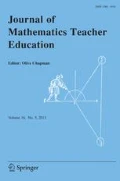Abstract
This paper presents the findings of an empirical research project, designed with a combination of qualitative and quantitative methodology. Our goal was to apply Wiener attribution theory with a mathematics-specific pedagogical focus as a lens for analysing reflections. Our database consists of the prospective teachers’ reflections on self-performed lessons. Prospective teachers (N = 104) reflected on the mathematics lessons they performed. The first lesson was performed at the beginning of their teacher preparation programme and the second one at the end of the programme. A significantly larger number of participants exhibited predominantly internal locus of control regarding teaching situations at the end of the teacher preparation programme. Similarly, a significantly larger number of participants shifted their focus from general pedagogical aspects to the mathematics-specific pedagogical aspects of their teaching performance. Additionally, prospective teachers’ who exhibited predominantly internal locus of control reflected more often on the importance of pupil-centred approaches. Despite progress in observed elements, we still have some concern regarding the overall situation of teaching early mathematics.
Similar content being viewed by others
References
Ball, D. L., & Bass, H. (2000). Interweaving content and pedagogy in teaching and learning to teach: Knowing and using mathematics. In J. Boaler (Ed.), Multiple perspectives on the teaching and learning of mathematics (pp. 83–104). Westport, CT: Ablex.
Ball, D., Thames, M. H., & Phelps, G. (2008). Content knowledge for teaching: What makes it special? Journal of Teacher Education, 59(5), 389–407. https://doi.org/10.1177/0022487108324554.
Bell, C. A., Wilson, S. M., Higgins, T., & McCoach, D. B. (2010). Measuring the effects of professional development on teacher knowledge: The case of developing mathematical ideas. Journal for Research in Mathematics Education, 41(5), 479–512. https://doi.org/10.2307/41110411.
Bezgovšek Vodušek, H., & Lipovec, A. (2014). The square as a figural concept. Bolema-Boletim de Educação Matemática, 8(48), 430–448. https://doi.org/10.1590/1980-4415v28n48a21.
Braun, V., & Clarke, V. (2006). Using thematic analysis in psychology. Qualitative Research in Psychology, 3, 77–101. https://doi.org/10.1191/1478088706qp063oa.
Buluş, M. (2011). Goal orientations, locus of control and academic achievement in prospective teachers: An individual differences perspective. Educational Sciences: Theory and Practice, 11(2), 540–546.
Cook, L. D. (2012). Teacher locus of control: Identifying differences in classroom practices. International Journal of Multiple Research Approaches, 6, 285–296. https://doi.org/10.5172/mra.2012.1501.
Ghanizadeh, A., & Ghonsooly, B. (2014). A tripartite model of EFL teacher attributions, burnout, and self-regulation: Toward the prospects of effective teaching. Educational Research for Policy and Practice, 13, 145–166. https://doi.org/10.1007/s10671-013-9155-3.
Hesse-Biber, S. N., & Leavy, P. (2004). Distinguishing qualitative research. In S. N. Hesse-Biber & P. Leavy (Eds.), Approaches to qualitative research: A reader on theory and practice (pp. 1–15). New York: Oxford University Press.
Keller, J. M. (1987). Development and use of the ARCS model of instructional design. Journal of instructional development, 10(3), 2–10.
Konan, N. (2013). Educational supervisors’ locus of control. Eurasian Journal of Educational Research, 51, 45–64.
Lamote, C., & Engels, N. (2010). The development of student teachers’ professional identity. European Journal of Teacher Education, 33(1), 3–18. https://doi.org/10.1080/02619760903457735.
Leder, G. C., Pehkonen, E., & Törner, G. (Eds.). (2006). Beliefs: a hidden variable in mathematics education? (Vol. 31). Berlin: Springer.
Lincoln, Y. S., & Guba, E. G. (1985). Naturalistic inquiry. California: Sage Publications.
Lipovec, A., & Antolin, D. (2014). Slovenian pre-service teachers’ prototype biography. Teaching in higher education, 19(2), 183–193. https://doi.org/10.1080/13562517.2013.836090.
Lipovec, A., & Antolin Drešar, D. (2012). Solving problems on the blackboard in Slovenian high education mathematics classrooms. The New Educational Review, 30(4), 45–55.
Ma, L. (2010). Knowing and teaching elementary mathematics: Teachers’ understanding of fundamental mathematics in China and the United States. Mahwah, NJ: Erlbaum.
McIntyre, T. C. (1984). The relationship between locus of control and teacher burnout. British Journal of Educational Psychology, 54(2), 235–238. https://doi.org/10.1111/j.2044-8279.1984.tb02585.x.
Monshi Toussi, M. T., & Ghanizadeh, A. (2012). A study of EFL teachers’ locus of control and self-regulation and the moderating role of self-efficacy. Theory and Practice in Language Studies, 2(11), 2363–2371.
Ong’Ondo, C., & Borg, S. (2011). We teach plastic lessons to please them – the influence of supervision on the practice of English language student teachers in Kenya. Language Teaching Research, 14(3), 509–528. https://doi.org/10.1177/1362168811412881.
Parkay, F. W., Greenwood, G., Olejnik, S., & Proller, N. (1988). A study of the relationships among teacher efficacy, locus of control, and stress. Journal of Research & Development in Education, 21(4), 13–22.
Pihlaja, P. M., & Holst, T. K. (2013). How reflective are teachers? A study of kindergarten teachers’ and special teachers’ levels of reflection in day care. Scandinavian Journal of Educational Research, 57(2), 182–198. https://doi.org/10.1080/00313831.2011.628691.
Rose, J. S., & Medway, F. J. (1981). Teacher locus of control, teacher behaviour, and student behaviour as determinants of student achievement. Journal of Educational Research, 6, 375–381.
Rotter, J. B. (1966). Generalized expectancies for internal versus external control of reinforcement. Psychological Monographs, 80(1), 1–28.
Schoenfeld, A. H. (2010). How we think: A theory of goal-oriented decision-making and its educational applications. New York: Routledge.
Schon, D. D. (1996). Education the reflective practitioner: Towards a new design for teaching and learning in the professions. San Francisco: Jossey-Bass.
Vaismoradi, M., Turunen, H., & Bondas, T. (2013). Content analysis and thematic analysis: Implications for conducting a qualitative descriptive study. Nursing & health sciences, 15(3), 398–405. https://doi.org/10.1111/nhs.12048.
Wiener, B. (1986). An attributional theory of motivation and emotion. New York: Springer. https://doi.org/10.1007/978-1-4612-4948-1.
Wittmann, E. C. (2003). Was ist Mathematik und welche pädagogische Bedeutung hat das wohlverstandene Fach auch für den Mathematikunterricht der Grundschule. In M. Baum & H. Wielpütz (Eds.), Mathematik in der Grundschule (pp. 18–47). Seelze: Kallmeyer.
Author information
Authors and Affiliations
Corresponding author
Additional information
Publisher's Note
Springer Nature remains neutral with regard to jurisdictional claims in published maps and institutional affiliations.
Rights and permissions
About this article
Cite this article
Lipovec, A., Podgoršek Mesarec, M. Prospective primary teachers’ shift in locus of control and pedagogy focus. J Math Teacher Educ 24, 361–373 (2021). https://doi.org/10.1007/s10857-020-09463-3
Published:
Issue Date:
DOI: https://doi.org/10.1007/s10857-020-09463-3




